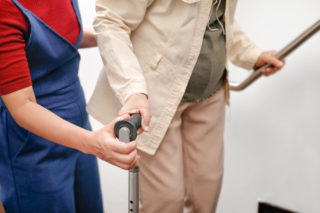According to the National Council on Aging (NCOA), one in four American adults over 65 fall each year. In fact, it’s the most common injury for in this age group in our country. And, while not all falls are fatal, they can highly impact the way older adults live – both physically and financially – for years after, and sometimes forever.
The good news is, there are several things you can do to help avoid you or your loved one from falling into this statistic. If you’re renting, don’t hesitate to talk to your landlord about your concerns and discuss ways they can help you make the proper adjustments to fit your specific needs. If you’re the homeowner, the following are simple, universal adjustments designed to help turn your home into a fall-free environment.

Know your conditions.
Before you work to improve your living conditions, understand your own condition, or that of the person you’re taking care of. For instance, do you or your loved one have trouble standing up or walking freely? Are there other factors or health conditions worth noting, such as dementia? Once you understand specific needs you can plan accordingly with the proper updates. Remember, physical needs call for different updates than mental ones. Sometimes, you’ll find it best to update for both.
Begin in the bathroom.
For starters, non-slip mats are an essential first step to a fall-free environment. Put down a few non-slip bathmats for optimal traction in the shower and on your tile or linoleum floor. In addition, install more handles, rails and bars. The work well at the entry point, next to the toilet and inside and outside of the bath or shower. There are plenty of options available that don’t require years of carpentry experience.
Adapt the bedroom.
A quick update that can make a world of difference is the use of contrasting colors in the bedroom. If the carpet is light, use dark bedding and dark curtains so your loved one can see a clear difference between items in the room. If the walls are dark, install lighter wall socket fixtures to make light switches and fan switches more accessible. It may not be a bad idea to label the switches for a more deliberate experience. If you’re updating to combat symptoms of dementia, remember to keep those curtains open during daylight hours to insinuate daytime, and close them at night to promote a healthy sleep cycle. Keep additional lights in the room; include an easy-to-access nightstand lamp and night-lights to illuminate a path to the bathroom, doorway or closet. The more lighting options, the better, to avoid bedroom falls.

Update the kitchen.
Like the bedroom, set your table with contrasting-colored items to prevent mistaking or misplacing surfaces—something as simple as sliding a plate off the table can cause a serious injury. Remember to put the most used items in easy-to-reach places to avoid reaching or straining. And if food or drink is spilled, remember to clean it up immediately; a wet floor is a fall waiting to happen.
Work in progress.
Just like any home improvement project, you don’t have to finish making your home fall-proof the same day you start. Try starting with the basics and build from there. You may find that, as health conditions change or progress, you may have to do more to do around the house to keep it safe. Like many aspects of homeownership, safety is a work in progress, but with the right tweaks, updates and installations, you can help yourself or a loved one stay safe at home.


